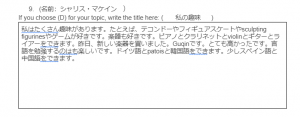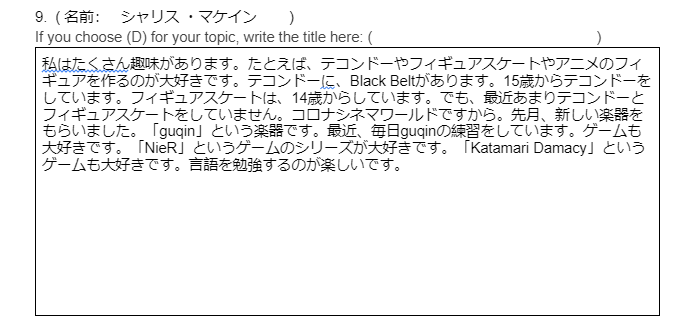Transfer & Connections to Discipline
I believe that the course materials from my JAPN 311 Communicative Competence: Speaking and Listening as well as the course as whole connect most closely to what I have learned in this course. While both courses are quite different as they have different focuses, the way I gained information and skills from the 311 course reminds me of the same learning methods used to help me gain more information and skills in the 312 course. For example, a lot of learning in both courses were done through firsthand experiences. This includes TalkAbroad assignments for both, but there were other assignments that also used this sort of method. One pair of assignments I would like to compare the most is the 311 course’s weekly podcast and the 312 course’s weekly group journal. For both assignments, both ODU students and students in Japan had to learn simply through interacting with each other. This helps me to better understand not only more about my own major, which is international studies, but also more about the world as a whole. In life, we are constantly learning countless information. We don’t even have to interact with others to gain more knowledge, even simply observing can do a good job on its own. These assignments made me realize that along with just how much of an impact interacting with others can have on us, even if we don’t expect it. This prepares me to view the world from a different perspective by putting greater value on each interaction I have and to also be more open to approaching others. It also helps me to realize that I myself can also have an impact on others just through conversation.
Self-Assessment and Reflection
Writing has always been one of the more difficult sides to learning Japanese for me, so naturally there were many times where I faced challenges this semester. Trying to figure out which particles to use and how to make sentences sound natural often felt like something that wasn’t going to be even slightly achievable to me anytime soon. However, doing assignments such as the group journal and being able to see the typing style of natural Japanese speakers helped me immensely, even despite the assignment’s own difficulties. Incorporating the writing patterns used by the Japanese students led to the major improvement of my own writing. At first, I didn’t even realize how large of an influence these assignments had on me. It only became obvious to me after looking back.

This is what my writing looked like at the beginning of the semester for our first in-class writing assignment done on January 13th.
This is my writing on the same topic done on March 1st, a little less than two months later. Dictionary and translation tools were not allowed for these in-class writing assignments.
In the first writing, I was mainly focused on just trying to spit out as much small bits of information as I could. This led to a lot of incredibly short sentences and topics jumping from place to place. There wasn’t much consistency and I did not take the time to further expand on or to provide much background on the topics that I did bring up. It was a very simple passage.
In the second writing, however, a surprising amount of improvement has been made for such a short time. I spent more time focusing on providing more detail on the topics at hand rather than listing a bunch of smaller pieces of information. Thus, the overall flow of the passage is much smoother. My sentences also grew a lot in length, as I was exploring the use of different sentence formats.
By simply practicing and reading writing entries from both my fellow JAPN 312 classmates as well as the writing from the students in Japan, I was able to understand how to resolve many of the issues I was having and apply the solutions to myself. I believe this strategy will help me a lot in the future, as it helped me realize that sometimes the best way of learning is by watching and imitating others. Of course, this may not work in all contexts, but in experiences such as this one it really can be one of the best ways to improve.
